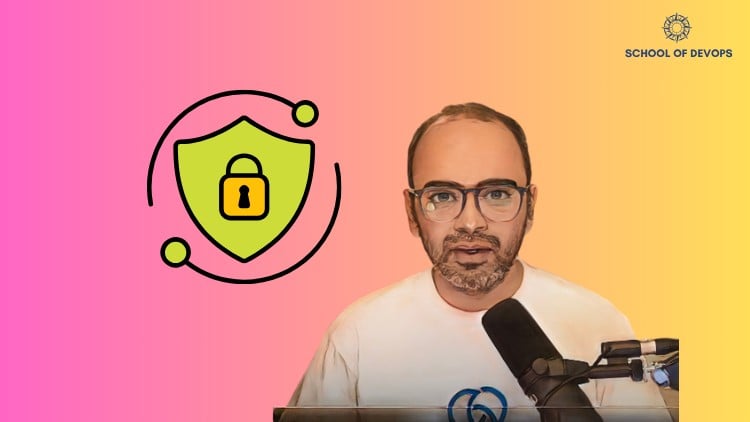
Build Complete DevSecOps Pipeline with Container Based Delivery, CI/CD on Kubernetes with all Open Source Tools
⏱️ Length: 9.6 total hours
⭐ 4.60/5 rating
👥 8,590 students
🔄 April 2025 update
Add-On Information:
Note➛ Make sure your 𝐔𝐝𝐞𝐦𝐲 cart has only this course you're going to enroll it now, Remove all other courses from the 𝐔𝐝𝐞𝐦𝐲 cart before Enrolling!
-
Course Overview
- Dive deep into integrating security across the entire software development lifecycle, from initial code commit to production deployment.
- Master the art of embedding robust security practices directly into your CI/CD workflows, ensuring continuous protection.
- Gain an end-to-end understanding of how to build, secure, and operate cloud-native applications efficiently.
- Explore practical strategies for fostering a proactive security-first culture within your development and operations teams.
- Learn to transform traditional DevOps pipelines into resilient, security-conscious DevSecOps ecosystems.
- Discover methodologies for automating security checks and vulnerability management at every stage of development.
- Understand the strategic advantages of ‘shifting security left’, catching vulnerabilities early and cost-effectively.
- Prepare for real-world DevSecOps challenges by implementing industry best practices using popular open-source solutions.
- Elevate your skillset to become a pivotal asset in organizations striving for secure, rapid software delivery.
- This bootcamp offers a fast-track to expertise in deploying secure, scalable applications on modern infrastructure.
-
Requirements / Prerequisites
- Basic Linux CLI proficiency: Familiarity with navigating directories and executing commands.
- Fundamental software development concepts: Understanding of version control (Git) and application structure.
- Exposure to cloud computing principles: General awareness of IaaS, PaaS, and public cloud environments.
- Conceptual grasp of containerization: Basic understanding of Docker or similar container technologies.
- A Google Cloud Platform account: Required for setting up the practical lab environment (free tier usage possible).
- Reliable internet connection: Essential for streaming lectures and performing cloud-based labs.
- A code editor (e.g., VS Code): For viewing and modifying code samples and configuration files.
- No prior DevSecOps experience needed: This course builds from foundational concepts.
- Eagerness to learn and engage: The most crucial prerequisite for success in this hands-on bootcamp.
-
Skills Covered / Tools Used
- Secure CI/CD orchestration: Designing and implementing automated pipelines with integrated security gates.
- Container security best practices: Hardening container images and managing their lifecycle securely within a pipeline.
- Cloud-native security implementation: Applying security principles to applications deployed on modern container orchestration platforms.
- Automated vulnerability scanning techniques: Integrating diverse types of security scans into development and deployment pipelines.
- Infrastructure as Code (IaC) security: Ensuring secure configurations for your underlying infrastructure components.
- Policy-as-Code enforcement: Defining and automating security policies to maintain compliance and governance.
- Software supply chain security analysis: Identifying and mitigating risks associated with third-party components and dependencies.
- Real-time threat detection and response concepts: Understanding how to implement continuous monitoring for security events.
- Artifact management and security: Safely managing and scanning build artifacts throughout the pipeline.
- Version control system security: Implementing secure practices for source code management and access control.
- Open-source CI/CD automation tools: Hands-on experience with leading open-source solutions for pipeline construction.
- Integrated security scanning frameworks: Utilizing robust frameworks for identifying vulnerabilities at different stages.
- Container runtime security solutions: Exploring tools that provide protection for running containers.
- Secret management systems: Best practices for handling sensitive information securely in automated pipelines.
- Cloud platform security features: Leveraging native security services within a major cloud provider for enhanced protection.
- Comprehensive monitoring and logging tools: Implementing solutions for deep visibility into application and security events.
-
Benefits / Outcomes
- Confidently build and manage secure DevSecOps pipelines: From initial code commit to production deployment.
- Lead security initiatives within modern software teams: Becoming a key advocate for ‘security by design’.
- Significantly reduce organizational risk: By proactively identifying and addressing vulnerabilities throughout the SDLC.
- Accelerate secure software delivery: Integrating automated security into rapid release cycles without sacrificing safety.
- Enhance your marketability: As a highly skilled DevSecOps engineer, a sought-after role in the tech industry.
- Implement effective shift-left security strategies: Catching and fixing security issues early, saving time and resources.
- Master prevalent open-source DevSecOps tools: Gaining practical expertise with a stack that powers leading organizations.
- Foster a collaborative security culture: Bridging the gap between development, operations, and security teams.
- Contribute to resilient cloud-native applications: Ensuring your applications are robust against emerging threats.
- Prepare for advanced DevSecOps certifications: Laying a strong foundational and practical knowledge base.
- Solve complex security challenges: By applying a comprehensive understanding of automated security measures.
- Gain practical, deployable skills: Ready to be applied immediately in your current or future role.
-
PROS
- Highly rated by a large student base: Evidenced by 4.60/5 from 8,590 students, reflecting quality and effectiveness.
- Up-to-date and relevant content: With an April 2025 update, ensuring the latest tools and practices are covered.
- Concise yet comprehensive: At 9.6 total hours, it delivers significant value without a huge time commitment.
- Focus on open-source tools: Making the skills widely transferable and accessible without proprietary licenses.
- Practical, hands-on learning approach: Emphasizing building a complete pipeline for real-world experience.
- Strong emphasis on container-based delivery: Aligns with modern cloud-native deployment strategies.
- Expert instruction from School of Devops: Leveraging specialized knowledge in the field.
- Designed for immediate applicability: Skills learned are directly transferable to professional roles.
-
CONS
- Requires self-discipline for consistent progress: As a self-paced bootcamp, active engagement is key for optimal learning outcomes.
Learning Tracks: English,IT & Software,Network & Security
Found It Free? Share It Fast!